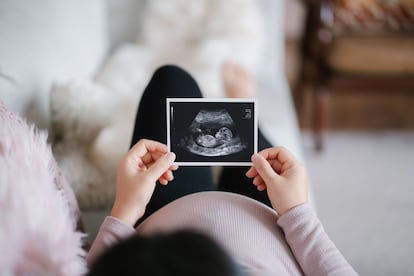One in five women conceive naturally after having a baby through fertility treatment
Hormonal changes and the lack of stress may explain why a woman naturally achieves a pregnancy that seemed impossible before in-vitro fertilization

In February 2015, María López Ibáñez set foot in a fertility clinic for the first time. She was 28 years old and had been trying to get pregnant with her partner for nine months. “This fertility consultation is usually done when a couple has been trying to get pregnant for a year, but I went before,” she explained to EL PAÍS. While performing a hysterosalpingography (a radiological test of the uterine cavity and fallopian tubes), the doctors verified that her tubes presented some obstruction that had prevented them from achieving pregnancy. “Then they told us that, given the problem, the only possible option was to do an in vitro fertilization (IVF),” she recalls. It was October 2015. In July 2016, her daughter Rocío came into the world.
When she was 8 months old, María and her partner went back to a fertility clinic to try for a second pregnancy. A month later, without giving her time to take any tests, she was pregnant with Clara, who would be her second daughter and who would be joined a few years later by Leo, also conceived naturally. “A gynecologist told me that, after having one pregnancy, with the hormonal changes that it causes, the tubes, if they are not totally obstructed, can become permeable, so that the infertility problem is solved,” she says.
“In pregnancy, progesterone increases a lot. This hormone, in high doses, has a certain anti-inflammatory effect,” says Antonio Requena, IVI’s general medical director, who gives an example of a disease closely related to infertility, endometriosis: “The hormonal changes of pregnancy help to improve endometriosis, so that some women who have a pregnancy through in vitro fertilization, during a period after childbirth, can achieve a pregnancy naturally that they could not achieve before.”
Amassing data on how many women achieve it, however, “is not easy,” acknowledges Requena, because these couples do not usually notify assisted reproduction clinics. Hence, the importance of the data obtained from a study recently published in the scientific journal Human Reproduction and led by researchers from the Institute of Health of the Woman from University College London. It analyzed the results of eleven studies from around the world carried out between 1980 and 2021, which included more than 5,000 women. The bottom line: at least one in five women conceive naturally after having a baby through fertility treatment, mostly within three years of the first birth.
“This is the first time that all global data on natural conception rates after having an IVF-conceived baby has been reviewed and combined, and the findings contradict the widespread media message and mainstream opinion that this is a rare phenomenon,” Annette Thwaites, lead author of the study, told EL PAÍS.
What makes it possible?
In addition to the hormonal changes that pregnancy causes, which can improve the prognosis of diseases such as endometriosis, the experts consulted point out other factors that, in one way or another, could explain why a woman naturally achieves a pregnancy that seemed impossible before IVF.
On the one hand, Antonio Requena points out a very simple cause: there is a group of couples who present 100% infertility and who will never be able to get pregnant naturally. However, there is also an important sector of the population that presents subfertility, that is to say, that at a given moment they may be less fertile. “For example, in the case of men, the quality of the semen can vary a lot from one month to another. In other words, you can have a period with lower semen values and, therefore, be less fertile, but there may also be times of the year when that semen improves. And in the case of women, the same thing happens: there are women with a lower quality of eggs; but that does not mean that all her ovules are incompatible with a pregnancy,” argues the general medical director of IVI, who also points out the importance of the psychological factor.
In the end, the fact of looking for a child and accumulating negatives month after month causes stress in the couple. Can it be said that stress is a source of infertility? “Not 100%, but it does cause even the couple’s sex life to start revolving around getting pregnant. All of this, once you have a child, relaxes, because the objective of motherhood is already fulfilled. And that relaxation is sometimes also important so that couples can have a child spontaneously,” explains Requena.
The main author of the study agrees, though with some nuances. “The importance of psychological factors in fertility is well recognized and widely accepted, but studies are conflicting on this point,” says Annette Thwaites, who considers it “biologically plausible” that ovarian stimulation of cycles of IVF can improve ovarian function, “in a mechanism similar to the surgical technique of ovarian drilling.” This argument is not shared by Antonio Requena, who considers that after a pregnancy, nine months in which the ovary is very at rest, “it is difficult for the ovary to have any memory of the stimulation performed during IVF afterward.”
Whatever the cause, Thwaites believes that the results obtained in the study leave a clear message: women who undergo IVF should be aware that future conception without treatment is not something utopian: “It is relevant information for future decision-making. If getting pregnant again is not what a woman wants at the moment, despite having had to resort to IVF to conceive a first child, she should be offered contraceptive advice. Currently, the contraceptive needs of these women are being overlooked, with major consequences for families.”
Antonio Requena extends that message to couples who start IVF treatment: “I always warn couples who do not present 100% infertility that I cannot tell them that within a month they will not become pregnant naturally” Still, he advises caution: “if we turn the results of the study around, we will see that there are 80% of women who do not manage to get pregnant naturally after IVF treatment. Therefore, I would say to women of advanced maternal age that, if they want to seek a second pregnancy, do not leave everything waiting for that potential natural pregnancy at a moment when time is of the essence.”
Sign up for our weekly newsletter to get more English-language news coverage from EL PAÍS USA Edition
Tu suscripción se está usando en otro dispositivo
¿Quieres añadir otro usuario a tu suscripción?
Si continúas leyendo en este dispositivo, no se podrá leer en el otro.
FlechaTu suscripción se está usando en otro dispositivo y solo puedes acceder a EL PAÍS desde un dispositivo a la vez.
Si quieres compartir tu cuenta, cambia tu suscripción a la modalidad Premium, así podrás añadir otro usuario. Cada uno accederá con su propia cuenta de email, lo que os permitirá personalizar vuestra experiencia en EL PAÍS.
¿Tienes una suscripción de empresa? Accede aquí para contratar más cuentas.
En el caso de no saber quién está usando tu cuenta, te recomendamos cambiar tu contraseña aquí.
Si decides continuar compartiendo tu cuenta, este mensaje se mostrará en tu dispositivo y en el de la otra persona que está usando tu cuenta de forma indefinida, afectando a tu experiencia de lectura. Puedes consultar aquí los términos y condiciones de la suscripción digital.









































